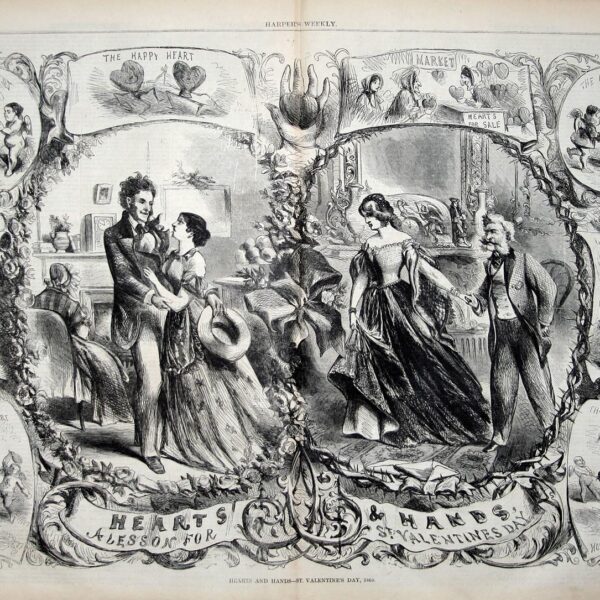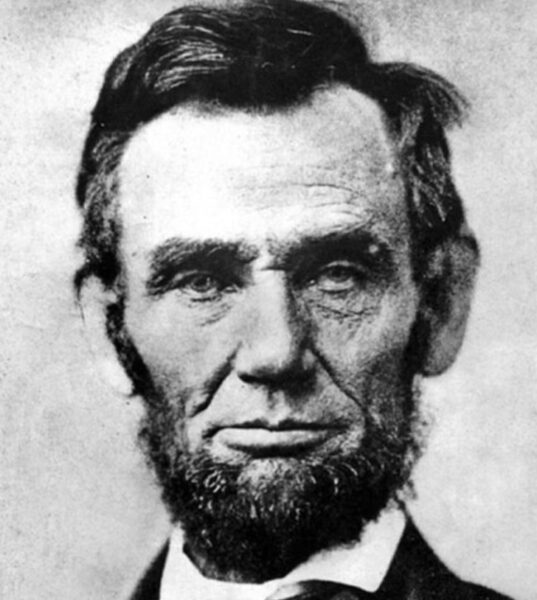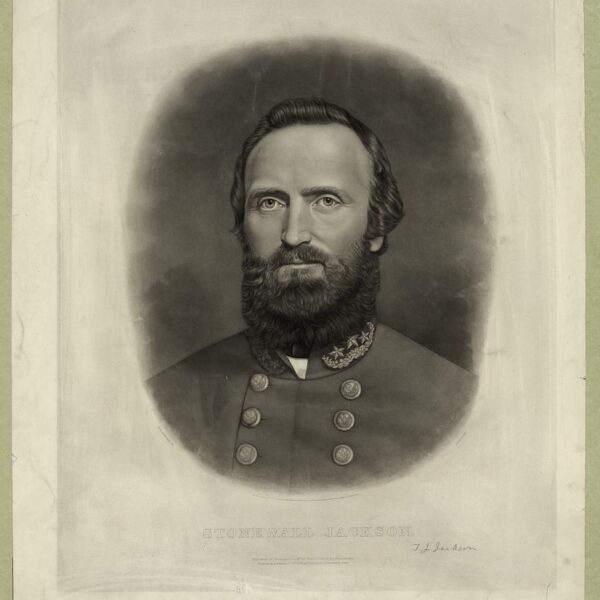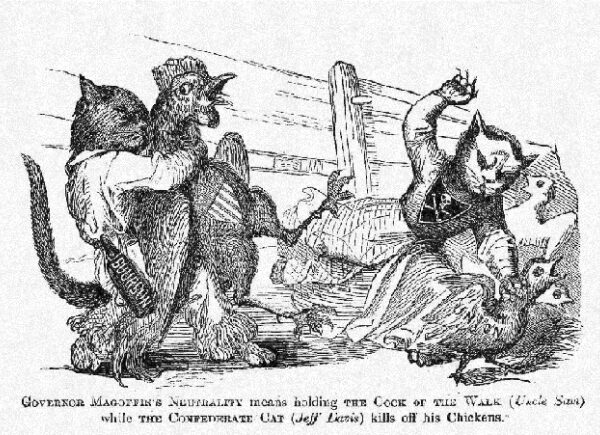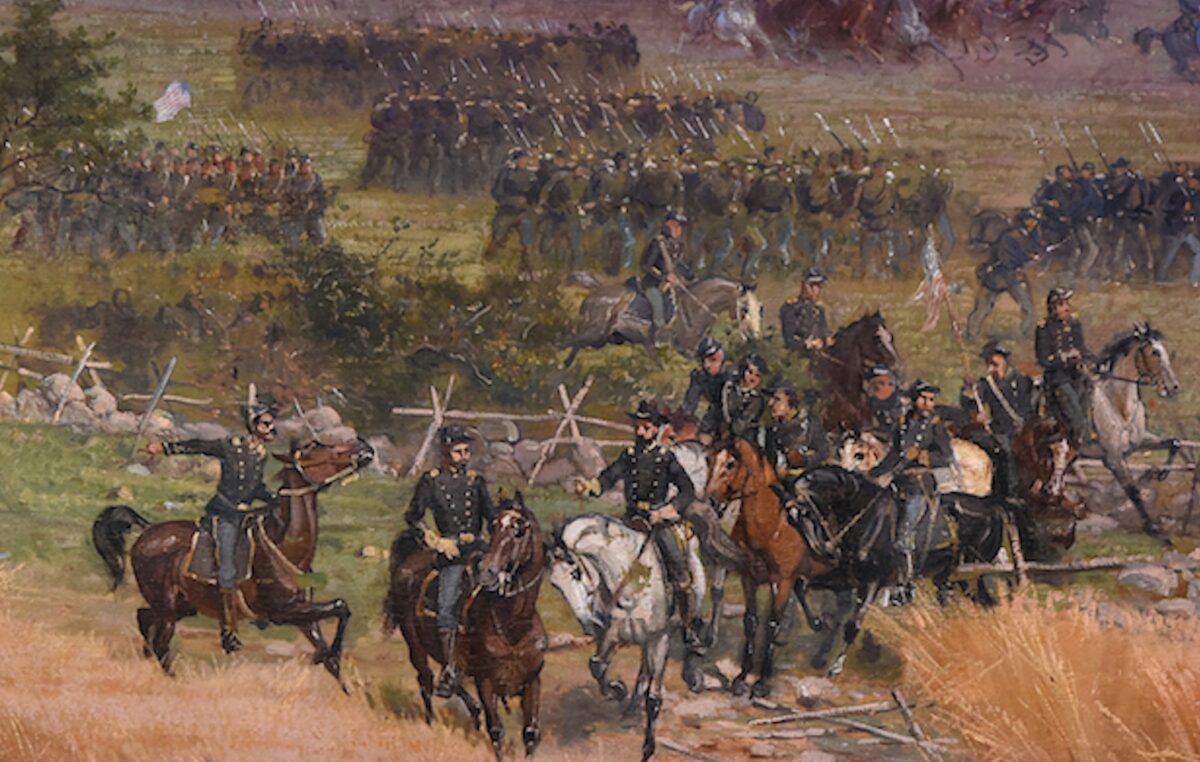 JASON MINICK/GETTYSBURG FOUNDATION
JASON MINICK/GETTYSBURG FOUNDATIONIn this scene from the Gettysburg Cyclorama, Union soldiers advance toward the sound of the guns during the battle.
For our latest newsstand-only special issue, Gettysburg, we asked a number of Civil War historians for their opinions on a variety of topics, including the battle’s most overrated and underrated performances, best photos, and most compelling monuments. Space constraints prevented us from including the answers to one of the questions we posed: What are the five best books about the Battle of Gettysburg (nonfiction or fiction)? Here are their responses.
Allen C. Guelzo
1. The Gettysburg Campaign: A Study in Command (1968) by Edwin B. Coddington
Coddington’s work has become the touchstone book for understanding the full scope of Gettysburg, treating the campaign and not just the battle, from Robert E. Lee’s preparations to the crossing of the Potomac River at Williamsport and Falling Waters. Its great strength is its thoroughness, and it was the first to use in full the papers, letters, and testimonies assembled by John Bachelder from the battle’s participants. Its weakness is its plodding, tedious style, which often makes it a book more recommended than read.
2. High Tide at Gettysburg (1958) by Glenn Tucker
High Tide at Gettysburg is a journalist’s rather than a historian’s work, and for sheer readability, there is no other single-volume history of the battle to match it. Tucker is long on personalities (which interested him the most) and short on military chitchat (there are, for instance, no maps), and he breathes a gentle but definite spirit of admiration for the Army of Northern Virginia, and especially for James Longstreet. Tucker’s sympathetic portrayal of Longstreet was the background for Michael Shaara’s depiction of Longstreet in The Killer Angels, and the foundation for much of the modern rehabilitation of Longstreet’s reputation.
3. Pickett’s Charge—The Last Attack at Gettysburg (2001) by Earl J. Hess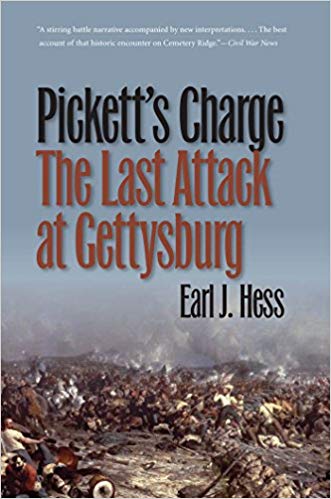
Hess’ study is the model of a Gettysburg micro-history. It’s done with a passion for completeness, and it’s also the first book that took notice of the significance of the fence rails on either side of the Emmittsburg Road—a point that got me thinking about the larger meaning of the fences in the whole Gettysburg battle. The judgments about the most famous attack in American history are careful and judicious; Hess is not in love with Longstreet, and, on the whole, he does not consider the attack to have been some ghastly error on Lee’s part.
4. Retreat from Gettysburg (2005) by Kent Masterson Brown
Retreat from Gettysburg does not at first seem like it ought to be on anyone’s top- five list for any battle book, since (as Winston Churchill said about Dunkirk) evacuations are not victories, no matter how successful. Brown, however, has managed to write a wonderfully compelling, highly readable book about a subject that he never allows to lapse into dreariness. He is precise on timings, locations, and even heads of cattle brought off, and he is remarkably generous in estimating that while Lee may have lost the Battle of Gettysburg, he salvaged a good deal from the campaign (including 45 road miles’ worth of captured stores).
5. Gettysburg: The First Day (2001) by Harry Pfanz
This is the first of three books that Pfanz, a longtime presence with the National Park Service staff at Gettysburg and the NPS chief historian, wrote about Gettysburg. Actually, any of the three (the other two are Gettysburg: The Second Day, which was the first of the trio, in 1987, and Gettysburg: Culp’s Hill and Cemetery Hill in 1993) would be a good nominee for this slot, since they all follow the same meticulous pattern: scorchingly detailed accounts of troop movements and encounters and microscopic focus on individuals and good personal stories. Pfanz tries to steer middle courses through some of the first day’s controversies (especially between Oliver Otis Howard and Winfield Scott Hancock). It may take longer to read Pfanz’s accounts of the various actions that made up the battle than it did for them to occur, but the rewards for the Gettysburg-obsessed are wonderful.
Allen C. Guelzo is the Henry R. Luce Professor of the Civil War Era and Director of Civil War Era studies at Gettysburg College, and is currently the Wm. L. Garwood Visiting Professor in the James Madison Program in American Ideals & Institutions at Princeton University. His book on the Battle of Gettysburg, Gettysburg: The Last Invasion, was a New York Times bestseller in 2013.
Lawrence Korczyk
1.The Gettysburg Campaign: A Study in Command (1968) by Edwin B. Coddington
Any study of the Gettysburg Campaign should begin with Coddington’s brilliant book. His work is not just a retelling of the battle but a critical analysis of the leadership and command decisions of the officers of the Union and Confederate armies. Among Gettysburg’s Licensed Battlefield Guides, Coddington’s work is considered one of the definitive studies of the campaign—one to be read, understood, and thoroughly analyzed.
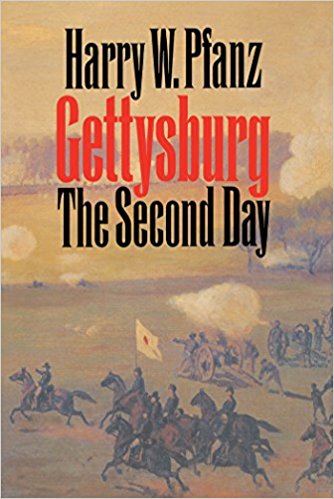 2. Gettysburg: The Second Day (1987) by Harry Pfanz
2. Gettysburg: The Second Day (1987) by Harry Pfanz
Pfanz, onetime chief historian at Gettysburg National Military Park, has written the definitive volume on the second day of the Battle of Gettysburg. Pfanz’s thorough understanding of the topography, exhaustive research, and clear writing has produced an outstanding micro-history of the fighting on July 2. Pfanz examines all of the tactical movements of the two armies in detail while also supplying valuable vignettes of the men in battle. His book is the battle narrative by which all others are measured.
3. The Killer Angels (1974) by Michael Shaara
One of the most compelling and vivid accounts of the Battle of Gettysburg is not a work of nonfiction but of fiction. Florida State University professor Michael Shaara, with imagination and beautiful writing, brings the battle to life with breathtaking character development and historically accurate detail. Shaara’s work, which was developed into the 1993 movie Gettysburg, has inspired tens of thousands of Americans to make the journey to Gettysburg to relive those three epic days in July 1863.
4. Gettysburg: A Journey in Time (1974) by William A. Frassanito
The publication of Frassanito’s ground-breaking Gettysburg: A Journey in Time produced an entirely new genre in Civil War historiography. For the first time, photographs of the Battle of Gettysburg were systematically analyzed and new information about them uncovered, altering our understanding and interpretation of the battle. Frassanito’s work created new generations of photographic detectives who wander the battlefield with photos in hand, reinterpreting the story of the epic engagement.
5. Gettysburg (2003) by Stephen W. Sears
Pulitzer Prize-winning author Stephen Sears’ remarkable book is another must- read for any student of the Battle of Gettysburg. The volume is exhaustively researched and beautifully written, and contains critical and deep insights into the command decisions of the two armies. It is simply one of the finest single volumes written on the battle.
Lawrence Korczyk, a Gettysburg Licensed Battlefield Guide since 2013, was recently elected vice president of the Association of Licensed Battlefield Guides. He is co-author of the book Top Ten at Gettysburg (2017).
Brian Matthew Jordan
1. Gettysburg: The Last Invasion (2013) by Allen C. Guelzo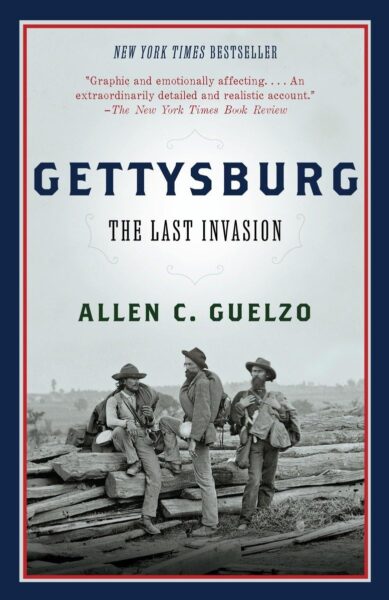
Guelzo’s keen attention to the texture and experience of the battle for ordinary soldiers, perceptive analysis of the politics that roiled the high commands, and ability to approach his subject from oblique angles render this book one of the finest Civil War battle studies ever written.
2. Gettysburg: The Second Day (1987) by Harry Pfanz
The former National Park Service historian’s command of source material and knowledge of the ground itself combines to produce a stellar narrative of the fighting on July 2, conveying its complexity while sacrificing nothing of clarity.
3. A Field Guide to Gettysburg (2013) by Carol Reardon and Tom Vossler
This dazzling guidebook is an essential battlefield companion for new students and veteran campaigners alike. Reardon and Vossler enrich superb narratives of the action with human color mined from careful spadework in pension files and other sources.
4. Gettysburg: A Journey in Time (1974) by William A. Frassanito
Once described as “Gettysburg’s Lieutenant Columbo,” William Frassanito produced a meticulous study of Gettysburg battlefield photography that has permitted generations of historians to—literally—see the events of July 1–3, 1863, from new angles.
5. The Colors of Courage (2004) by Margaret Creighton
With a rich sense of character development and good storytelling, this beautifully written book integrates the experiences of immigrant soldiers, women, and African Americans into the tale of the war’s most storied battle, offering a profound meditation on its legacy.
Brian Matthew Jordan is an assistant professor of history at Sam Houston State University. He is the author of Marching Home: Union Veterans and Their Unending Civil War (2014), which was a finalist for the 2016 Pulitzer Prize for history.
Ethan S. Rafuse
1. The Gettysburg Campaign: A Study in Command (1968) by Edwin B. Coddington
Excellent recent books about the battle by Stephen Sears and Allen Guelzo beat Coddington in terms of readability, and I would probably recommend them to anyone beginning their study of Gettysburg. For the truly serious, though, Coddington remains the outstanding, classic study of the campaign.
2. Pickett’s Charge in History and Memory (1997) by Carol Reardon
Reardon’s study is one of the best and most influential books on any Civil War topic to appear in the past few decades. It takes a much-studied and unquestionably important subject and offers the sort of compelling re-examination of what we know—and think we know—that only a truly outstanding scholar and student of history can deliver. Her compelling look at Pickett’s Charge and how history is made inspired a legion of folks to jump on the history and memory bandwagon.
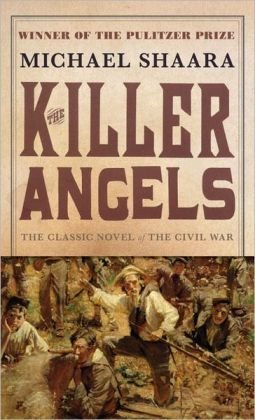 3. The Killer Angels (1974) by Michael Shaara
3. The Killer Angels (1974) by Michael Shaara
While The Killer Angels might not be an essential work for understanding the battle (although it is pretty good in that respect), the novel certainly made stars of Colonel Joshua Lawrence Chamberlain and the 20th Maine Infantry, and helps explain why today so many more people visit Little Round Top than, say, Culp’s Hill. Shaara might have gone overboard in his rehabilitation of the performance of James Longstreet. Still, anyone who skips this book is doing themselves a terrible disservice.
4. A Field Guide to Gettysburg (2013) by Carol Reardon and Tom Vossler
Visiting a battlefield and immersing yourself in the terrain is the best way to gain an understanding of what happened there, and a good guide to assist you as you explore the large and complex Gettysburg battlefield is essential. I am a big fan of Mark Grimsley and Brooks Simpson’s 1999 guide, but changes to the battlefield since its publication have rendered it long overdue for revision. Even a revised edition of that work, though, would be hard pressed to knock Reardon and Vossler’s book from the top spot among battlefield guides.
5. Retreat from Gettysburg (2005) by Kent Masterson Brown
This fascinating study places, as its title suggests, logistical considerations at the center of the Confederate campaign, drawing on fresh research to provide important insights. It is extremely difficult to make logistics the central component of a campaign study and produce a work that is not just informative but also interesting and compelling reading, but Brown pulls it off with great skill.
Ethan S. Rafuse is professor of history at the U.S. Army Command and General Staff College and the author, editor, or co-editor of 11 books. In 2018–2019 he will be the Charles Boal Ewing Visiting Professor at the U.S. Military Academy.
Lesely J. Gordon
1. Gettysburg: A Journey in Time (1974) by William A. Frassanito
This hugely influential study demonstrating the power of imagery in war was a game-changing book for me when I first read it as a teen.
2. Long Remember (1934) by MacKinley Kantor
One of my favorite novels of the Civil War, Kantor’s book is set in Gettysburg as the battle rages. At its center, the novel explores questions of loyalty, pacifism, love, and heroism.
3. The Colors of Courage (2004) by Margaret Creighton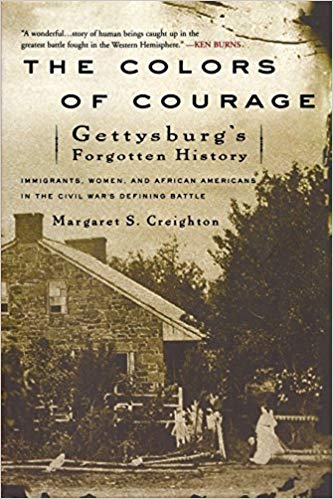
This innovative and insightful book reminds us that battles never happen in isolation.
4. The Gettysburg Campaign: A Study in Command (1968) by Edwin B. Coddington
Edwin Coddington’s well written and engaging study of the Battle of Gettysburg is a classic that endures. I still find myself consulting it 50 years after its publication.
5. The Gettysburg Nobody Knows (1999) ed. by Gabor Boritt
A wide-ranging and useful collection of essays based on lectures given at Gettysburg College’s Civil War Institute, this volume is an excellent reminder that Gettysburg is not entirely exhausted as a topic for new and original scholarship.
Lesley J. Gordon is the Charles G. Summersell Chair of Southern History at the University of Alabama. Her publications include General George E. Pickett in Life and Legend (1998), Inside the Confederate Nation: Essays in Honor of Emory M. Thomas (2005), and A Broken Regiment: The 16th Connecticut’s Civil War (2014). She was editor of the academic journal Civil War History.
Jennifer M. Murray
1. The Gettysburg Campaign: A Study in Command (1968) by Edwin B. Coddington
Although numerous campaign studies have been published since the release of The Gettysburg Campaign, none have equaled or surpassed Coddington’s, whose work is impeccably researched and offers nearly 200 pages of footnotes. Coddington is consistently my “go-to” book for any questions on the battle. He offers a comprehensive narrative of the Gettysburg Campaign and insightful analysis on leadership and decision-making. This book must be on the shelves and referenced often for any student of the battle.
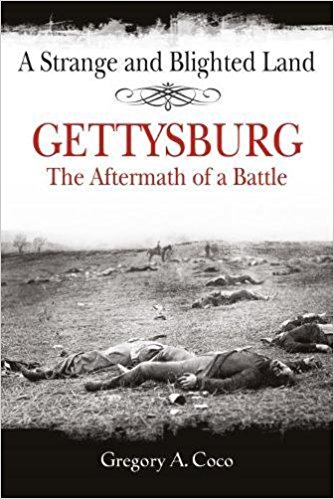 2. A Strange and Blighted Land (1995) by Gregory Coco
2. A Strange and Blighted Land (1995) by Gregory Coco
Years before academic historians considered the war’s “dark turn,” Gregory Coco, a Gettysburg National Military Park seasonal ranger and Vietnam veteran, offered a pioneering study that expanded the Gettysburg narrative beyond July 3, 1863. Coco’s work addresses the battle’s aftermath and its indelible imprint on the landscape and locals. Exploring the process of burying the dead, caring for the wounded, treatment of prisoners, and impact on civilians, A Strange and Blighted Land offers a significant contribution to Gettysburg scholarship and continues to define the conversation of the battle’s aftermath.
3. Gettysburg: Culp’s Hill and Cemetery Hill (1993) by Harry Pfanz
Pfanz’s work remains the definitive standard on the fighting along Culp’s Hill and Cemetery Hill. While often overshadowed in light of the fighting on the southern end of the battlefield on July 2, this work provides an excellent narrative of the action along the pivotal right flank of the Union line. Well-researched and written, Pfanz’s book offers a comprehensive narrative at both the strategic and tactical level, as well as insightful analysis on command decisions that remain debated by Civil War enthusiasts today.
4. The Bachelder Papers: Gettysburg in Their Own Words (1994) by John Bachelder
This three-volume set (edited by David and Audrey Ladd and published by Morningside Press) is indispensable for any researcher or student of the battle. John Bachelder traveled to Gettysburg after the battle to interview Union and Confederate soldiers about their experiences in the fight. The Bachelder Papers includes these interviews and correspondences that helped to define Bachelder as the battle’s first historian. Few individuals have worked to shape the history and memory of the battle and the origins and preservation of the battlefield as much as John Bachelder. His work should be on the shelves of all students of the engagement.
5. Gettysburg: A Journey in Time (1974) by William A. Frassanito
Because the Civil War was the nation’s first extensively photographed war, photographs prove an invaluable window into understanding the conflict itself and the visceral consequences of combat. Frassanito meticulously researched dozens of battlefield images to identify their photographers and the dates and locations they were taken, and to provide contemporary photos of the same vistas. Although his works do not redefine historiographical debates or challenge interpretations of the campaign or the battle, Frassanito has produced a subgenre of battlefield photography books (his Early Photography at Gettysburg, published in 1995, is also a standard) that advance an understanding of the engagement through images.
Jennifer M. Murray is a history professor at Oklahoma State University, where she teaches courses on the Civil War, Reconstruction, and military history. She is the author of On a Great Battlefield: The Making, Management, and Memory of Gettysburg National Military Park, 1933–2013 (2014) and is currently working on a biography of George Gordon Meade.

